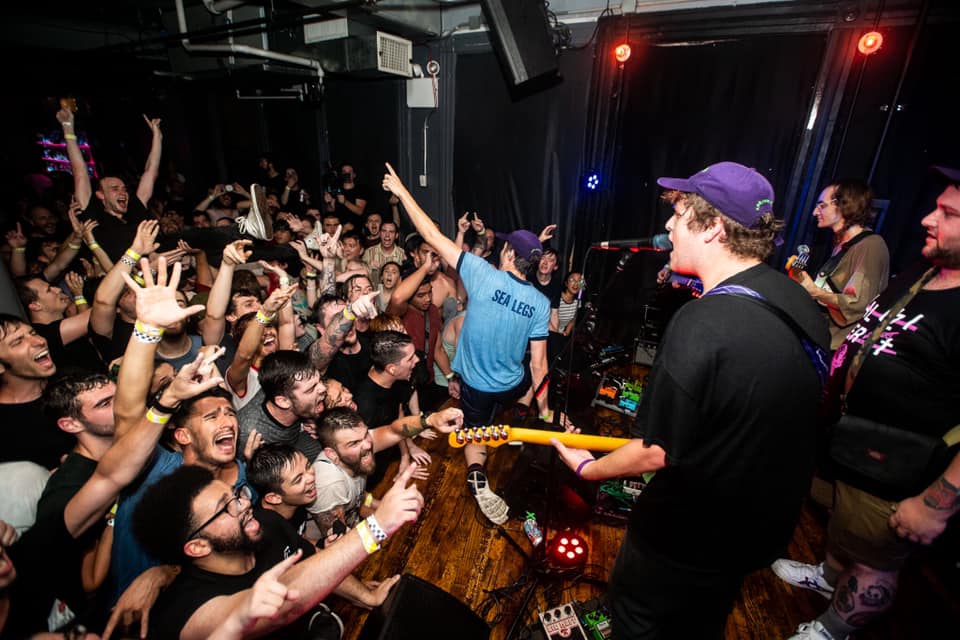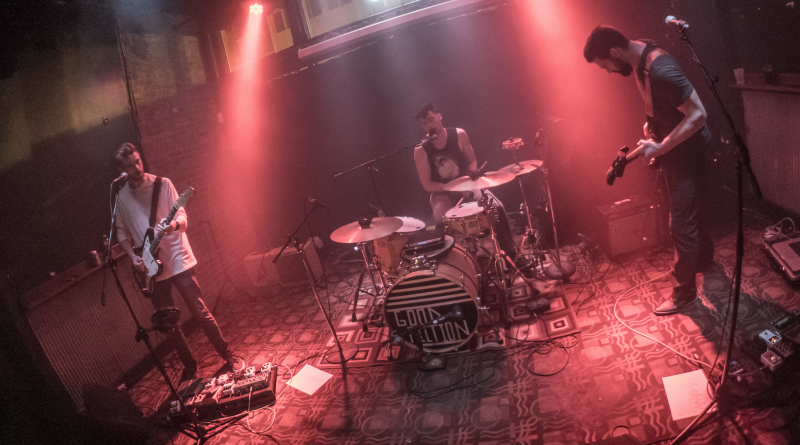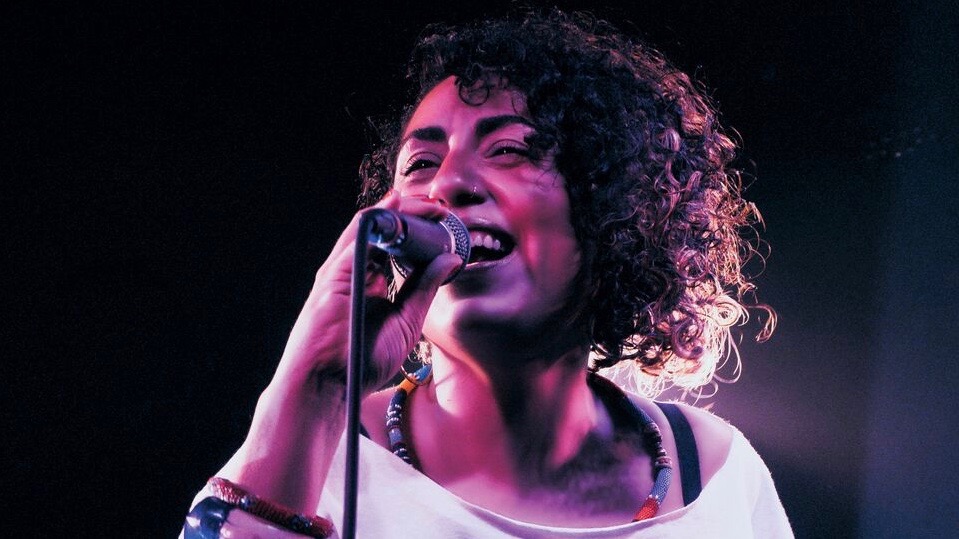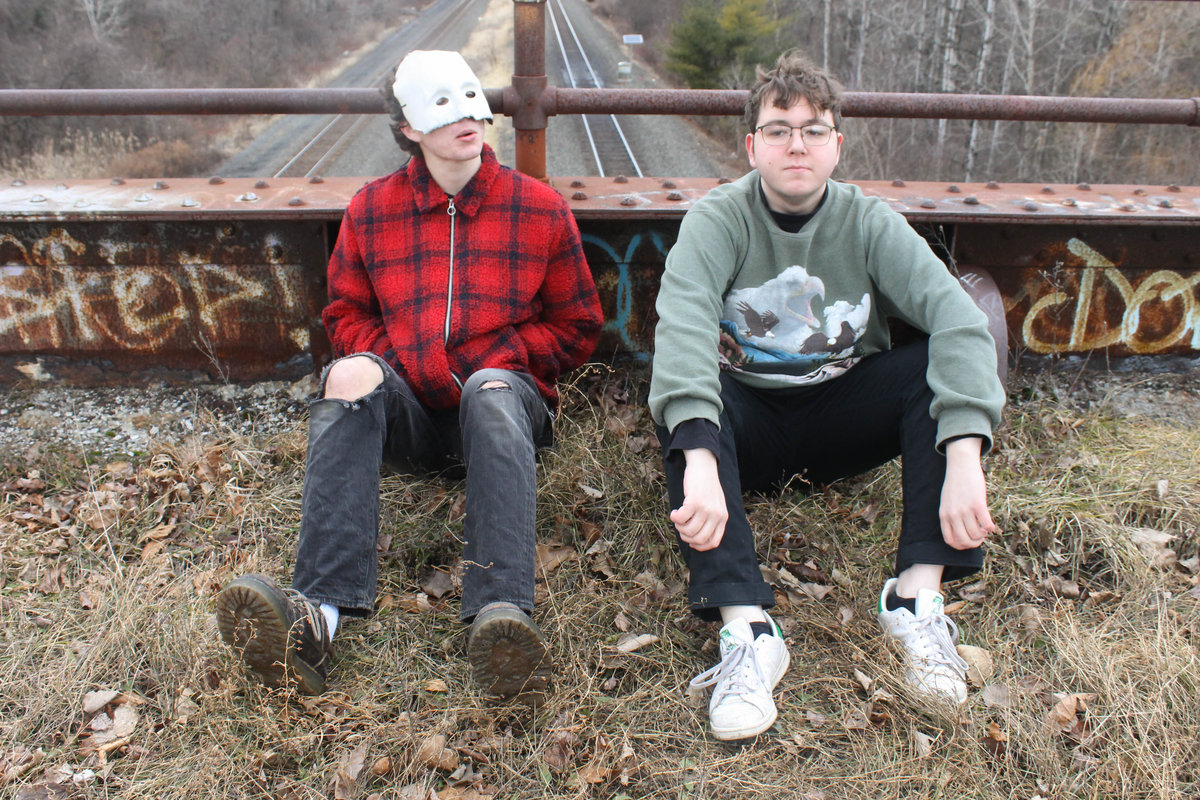Photo: Nick Karp
Earlier this year, the Albany punk quartet Prince Daddy & The Hyena began using the rocket ship emoji to promote their sophomore album Cosmic Thrill Seekers—a three-act concept record about space, the Wizard of Oz and depression—on their social media accounts. At first, members of the band and their team (their PR person, their label, the album’s guest musicians, etc.) used the emoji. But usage quickly spread to their rabid horde of fans, who began placing the graphic in their Twitter handles in order to signal their devotion to P Daddy.
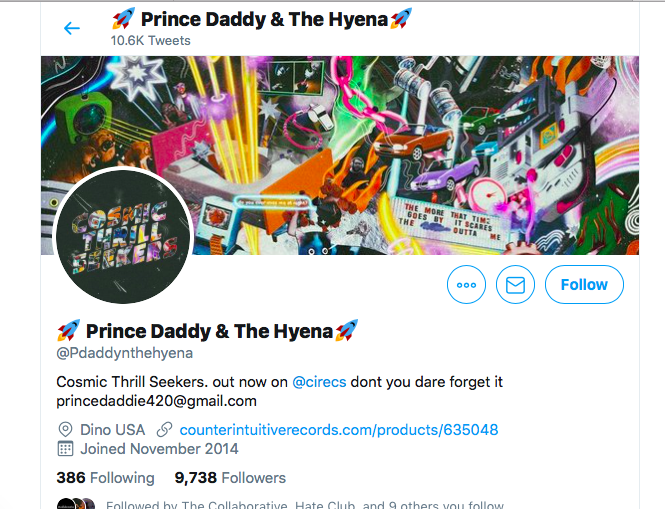
Just two months since the record’s release, frontman Kory Gregory says he’s seen at least 30 fans with tattoos of the emoji. By this point, the rocketship isn’t merely a piece of their iconography, it’s a symbol of their astral trajectory as career musicians. The packed crowds of screaming fans that they’ve drawn for years in Albany are replicated throughout the entire country. Their first ever headline tour just concluded last week and the band says, with emphatic gratitude, that they’re playing to hundreds of fans in places where they would’ve been lucky to draw 50 heads at just two years ago.
“Every show so far in every city has been our best show in that city, without a doubt,” Gregory says. He, his bandmates, P Daddy’s manager (Counter Intuitive Records owner Jake Sulzer) and their longtime friend Sam Kless (frontman of California emo-ska band Just Friends) spoke with The Collaborative while hanging in their van before the tour’s penultimate night in Pittsburgh. They’re parked right outside the venue, the 200-capacity Mr. Roboto Project, with their side doors wide open, as fans eagerly line up for entry well over an hour before the show’s start.
At one point, a 40-something-year-old man in a fedora approaches the van and asks the band to sign his vinyl copy of their record. Gregory casually mentions where he’s “been signing” on the album’s prismatic jacket, indicating that this sort of interaction is now his day-to-day. Before the guy leaves, he shamelessly hands the group fliers promoting his son’s band’s Spotify account and asks them to check it out. When parents start pushing their children’s music on you, you know your band’s made it.
However, crowd numbers are a more salient metric of their popularity. According to the band, when P Daddy played Boston in 2018—as a supporting act, mind you—150 people came out. This time, just over a year later, they sold out a 500-cap venue as headliners. The last time they played New York City, as recently as January, they played to 200 people. On their end-of-tour show in NYC on Aug. 31, they played to a sold-out crowd of 550.
“For the big shows, there are a couple hundred people upfront who are stage diving, who know every word to every song, even the newest songs,” Gregory says. “There are certain moments where, if a show’s going very well, I can step away and let them take over.”
The attendees’ age averages 14 to 20, they say, which hits the key demographic for a band looking to foster a lifelong fanbase. “I’d say that on average, every other show I have kids come up to me and say, ‘This is my first show of all time. My parents just dropped me off here, this is my first show ever. Thank you so much,’” Gregory says..
“I’ve been livestreaming the sets ever since I got on,” Kless says. Instead of hanging around California until Just Friends’ next tour, he decided to join the P Daddy camp and handle most of the driving. While the band plays, Kless steps to the front of the stage to hype the crowd, lift crowd surfers, bring water to the band between songs and show the kids who didn’t come out what they’re missing.
“[Livestreaming] gets the kids on the fence about coming,” he continues, “But also there’s a bunch of kids who can’t make it to some of these shows. Every single night there’s kids being like, ‘My mom wouldn’t let me come’ or ‘It’s a school night.’ So I’m giving kids the opportunity to see the set, and also it’s like, ‘Shit, you better get your tickets or this is what you’re gonna fuckin’ miss.’”
The majority of the people who do come out are superfans, not cool-guy types who stand in the back with their shoulders crossed, the band says. These crowds include fans who know 90 percent of the words that Gregory yells during an hour-plus set. It’s people who tell bassist Zakariya Houacine that their basswork was their inspiration to pick up the instrument. It’s people who drove five hours to see them play and who stage dive less than five minutes after nearly passing out from dehydration. It’s people who brought the band bags upon bags of clothes after they got all of their personal belongings robbed in Mexico. And most important to Gregory, it’s people who tell him how much his music means to them and how his lyrics have helped them through personal hardships.
“Even if there’s 10 people at this show tonight, if two of those 10 people say that to me, that’s enough,” he says. That, he suggests, is enough reason to continue making music.
Given that P Daddy play exuberant, heart-on-sleeve punk music to Gen Z teens, a ton of the band’s fandom is also expressed online. Although it’s difficult to calculate the number of P Daddy-related rocket ship emojis on Twitter and Instagram, one place has become a genuine hub for P Daddy discourse and fandom: a Facebook group called Prince Daddy & the Hyena – Cosmic Thrillposting. The 1,200-plus member group was created in mid-2018 by a handful of P Daddy fans in the UK who wanted a place for devotees to share memes about the band and frolic in their shared adoration.
Soon after it started, the band members joined and began inviting their friends and band-related colleagues, and now it’s a place where the band interacts with some of the biggest P Dady fans in an informal online setting. Gregory thinks of the group as a fan club, and treats it that way too. He posts links to new merch (namely the latest run of their iconic green hoodies, which have become their signature clothing item and always sell out quickly) there before they’re promoted on the band’s socials, and he enjoys chatting with people there who are interested in his lyrics and their gear.
“The first time I did [a livestream], I flashed one time on Cam [Handford, guitarist]’s pedal board and then they screencapped it and posted, ‘Who can identify any of these pedals?,’ Kless says with a laugh.
The most valuable aspect of the group is how it’s a reflective microcosm of their overall fan base. It emphasizes the type of person who identifies with P Daddy’s music. Chatting with a few members of the group reveals a noticeable throughline of acceptance and kindness. The group reflects the universal friendliness and compassion that’s always been present at their shows (from their earliest gigs in Albany) and was on full display that night in Pittsburgh.
“It seems to be very rare that a Prince Daddy fan isn’t a nice person, and I love that,” says Brodie Normandin, one of the founders of the Cosmic Thrillposting group and a longtime fan. “I’ve also been spotted at gigs in Prince Daddy merch from other gig-goers or band members and it’s started an instant connection that I otherwise don’t experience at shows.”
“I’ve been a part of a lot of online forums dedicated to bands, modded a music subreddit for a good while, and I’ve found that not every community is as kind as Prince Daddy’s fanbase,” says Lex Atchison, who’s attended P Daddy shows since they played to empty rooms. “Even some of the Facebook groups for bands around the caliber of Prince Daddy’s fan base can turn into toxic wastelands. But [‘Cosmic Thrillposting’] definitely never turned into that, not even a little bit.”
For 22-year-old Buffalo resident Alyssa Spellman, the excitement and genuine adoration for every facet of their music is a common thread among P Daddy fans. “I don’t think I’ve ever met a person who just casually listens to Prince Daddy,” she says. “Every conversation I’ve ever had about this band has turned into an in-depth talk about our favorite song and why. Or a wild story about seeing them live complete with jumping and clapping and excited little squeals about how much we appreciate them and that really says a lot to me.”
New York City resident Lindsey Miller, 20, says that P Daddy’s efforts to ensure their fans feel safe and welcome (both in real life and online) yields their diverse and warm community. “Unlike a lot of other more ‘punky’ bands, bands like P Daddy, Mom Jeans and Just Friends cultivate a community for everyone,” she says. “Most shows like this are mostly old white dudes, but this community is so special because it is made up of queer people, POC and women. And the band is super, super knowledgeable about their privilege and platform.”
Asked why he makes himself so accessible to his fans—online or after the gig—Gregory takes a minute to choose the right words.
“We are kind of grounded with our fans,” he says. “Like, we are all listeners of the same music that they’re listening to. Besides the fact that we’re playing in this band, we’re no different from our fans. Making sure that that separation doesn’t exist is important to us as a band—making sure that we’re always kind of eye-level with our fans.”
He means that literally as well as figuratively. “If it can be done, we try to set up in front of the stage,” he says.
A few hours later, after playing for over an hour to a merry scrum of people moshing, crowd-surfing and belting along, Gregory spends 15 seconds before their last run of songs to thank everyone in the room. “I know every band says ‘thank you’ on stage at the end of the night. But I really, really mean it,” he says. He repeated those words a few times, but it wasn’t necessary. Everyone in that room knew he meant it.

